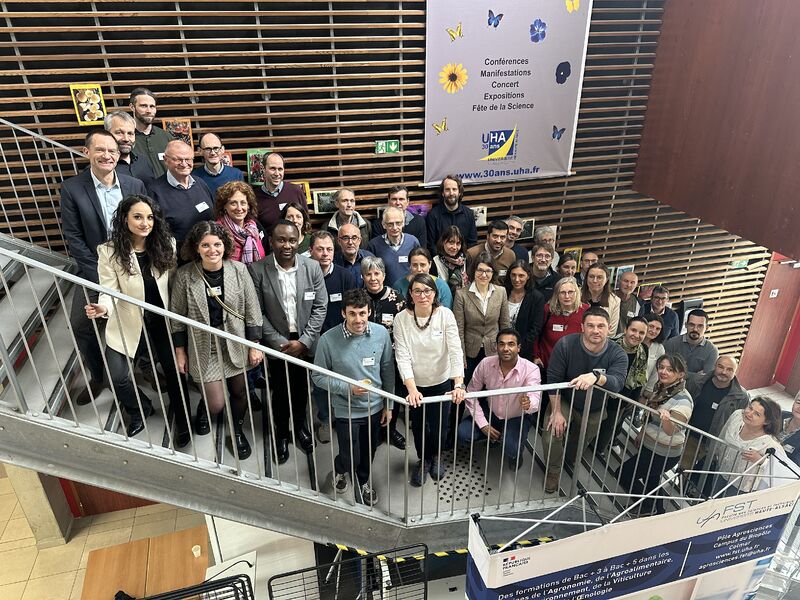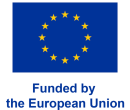- GrapeBreed4IPM has a budget of 5.000.000€ received from the European Commission in the framework of the Horizon Europe funding programme.
- In addition, one associated partner from Switzerland has also received 600.000€ received from the Swiss government.
- The project has 21 partners and associated partners from France, Germany, Italy, Spain, Austria, Switzerland and Serbia.
April 25th – The kick-off meeting of the European project GrapeBreed4IPM “Developing sustainable solutions for viticulture through multi-actor innovation targeting breeding for integrated pest management” took place last week at the Université Haute-Alsace, Colmar (France).
According to the World Economic Forum and the European Union’s Biodiversity Strategy for 2030, biodiversity loss and ecosystem collapse are major threats facing humanity in the next decade. Massive consumption of chemical pesticides in agriculture is a significant contributing factor. Viticulture is one of the crops that is highly dependent on chemical pesticide applications, consuming approximately 60% of the fungicides applied in the EU, making it a priority target for reducing the use of chemical plant protection products. At the same time, grapevine is economically and culturally important in the EU, with wine and wine-based products being among the top 3 largest EU agri-food sectors for export.
Recent advances and new perspectives in grapevine breeding have opened the possibility for GrapeBreed4IPM to address the reduction of fungicides and preserve biodiversity. Lessons learned from previous experience in viticulture have shown that success in improving sustainability relies on global involvement of all actors. For this reason, the main European research groups in viticulture have joined forces and are participating in this project with a multi-stakeholder and co-design approach to obtain the best knowledge and achieve maximum impact.
The project will develop grapevine varieties with resistance to relevant diseases, adapted to local environmental, soil and climatic conditions, and with the goal of reducing reliance on chemical pesticides. On the other hand, the project will also study consumer acceptance of this type of resistant varieties, which are relatively new and their wine less known so far, compared to traditional varieties. In addition, the project will provide farmers, winegrowers and advisers with best practices and guidelines for integrated pest management for a more environmentally friendly and sustainable viticulture in Europe, which is long awaited.
This project has five distinct objectives:
- Co-design a common vision from actors of the value chain and synchronize cross-regions.
- Research effort to provide a better understanding into molecular basis of susceptibility and resistance to grapevine pathogens and grapevine´s interactions with the environment.
- Participatory cross-breeding of new and diverse disease resistant varieties.
- Research effort towards breeding for emblematic disease resistance varieties without changing the wine characteristics of wines.
- Design and dissemination of tools and best practice guidelines.
The Institut National de Recherche pour l’Agriculture l’Alimentation et l’Environnement (INRAE) is leading the project in cooperation with 18 international partners and 2 associated partners: Julius Kühn-Institut – German Federal Research Centre for Cultivated Plants; Istituto di Genomica Applicata; Fondazione Edmund Mach; Institut Francais de la Vigne et du Vin; Staatliches Weinbauinstitut Freiburg; INRAE Transfert; Hochschule für Wirtschaft und Gesellschaft Ludwigshafen; Vivai Cooperativi Rauscedo; Horta; Ministerium für Wirtschaft, Verkehr, Landwirtschaft und Weinbau; Plataforma Tecnológica del Vino; Comité National des Interprofessions des Vins à appellation d’origine et à indication géographique; Neiker; Mercier, pépiniériste viticole; Verband Deutscher Rebenpflanzguterzeuger e.V.; Arbeitsgemeinschaft zur Förderung pilzwiderstandsfähiger Rebsorten; Moët Hennessy; Institut za Primeneu Nauke u Poljopriverdi; the Research Institute of Organic Agriculture and Les Vignobles Foncalieu.
Komlan Avia, a researcher from INRAE is the coordinator of GrapeBreed4IPM. The project started this April and will run for 4 years, ending in March 2028. For its implementation, GrapeBreed4IPM has a budget of 5.000.000€ received from the European Union in the framework of the Horizon Europe funding programme (Grant number 101132223), plus 600.000€ received by one associated partner from the Swiss government.
























